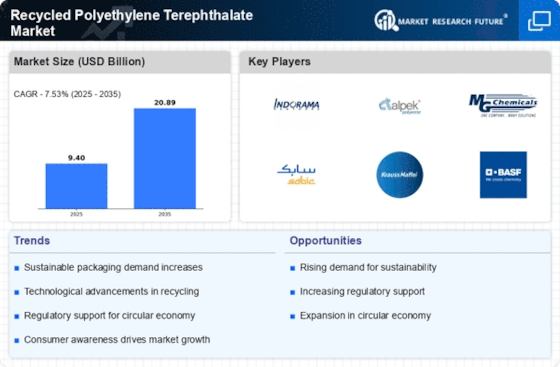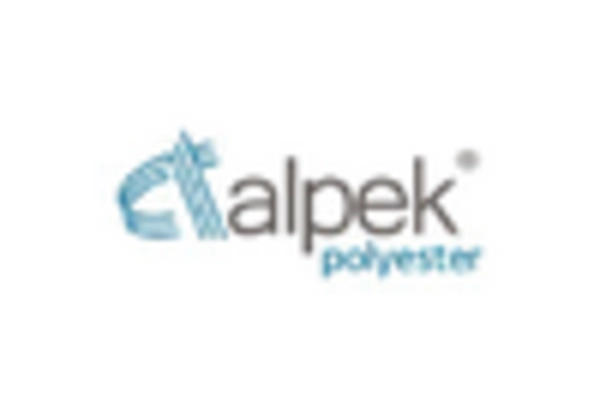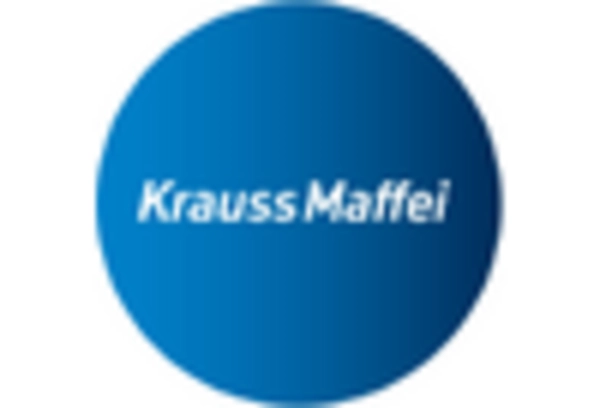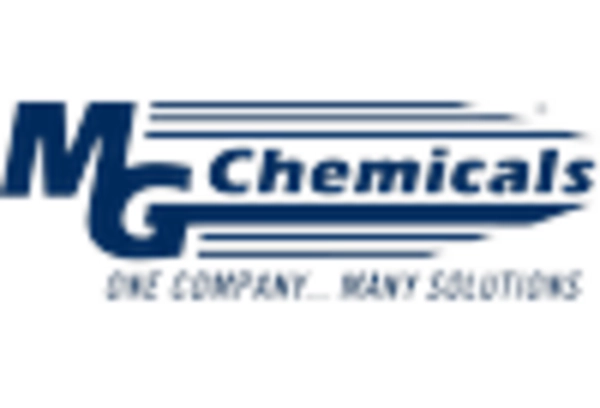Clear
Colored
Fiber
Sheet & Film
Strapping
Food Grade Bottles & Containers
Non-Food Grade – Bottles & Containers
Others
North America
Europe
South America
Asia Pacific
Middle East and Africa
North America Outlook (USD Billion, 2019-2035)
North America Recycled Polyethylene Terephthalate Market by Type
Clear
Colored
North America Recycled Polyethylene Terephthalate Market by Application Type
Fiber
Sheet & Film
Strapping
Food Grade Bottles & Containers
Non-Food Grade – Bottles & Containers
Others
North America Recycled Polyethylene Terephthalate Market by Regional Type
US
Canada
US Outlook (USD Billion, 2019-2035)
US Recycled Polyethylene Terephthalate Market by Type
Clear
Colored
US Recycled Polyethylene Terephthalate Market by Application Type
Fiber
Sheet & Film
Strapping
Food Grade Bottles & Containers
Non-Food Grade – Bottles & Containers
Others
CANADA Outlook (USD Billion, 2019-2035)
CANADA Recycled Polyethylene Terephthalate Market by Type
Clear
Colored
CANADA Recycled Polyethylene Terephthalate Market by Application Type
Fiber
Sheet & Film
Strapping
Food Grade Bottles & Containers
Non-Food Grade – Bottles & Containers
Others
Europe Outlook (USD Billion, 2019-2035)
Europe Recycled Polyethylene Terephthalate Market by Type
Clear
Colored
Europe Recycled Polyethylene Terephthalate Market by Application Type
Fiber
Sheet & Film
Strapping
Food Grade Bottles & Containers
Non-Food Grade – Bottles & Containers
Others
Europe Recycled Polyethylene Terephthalate Market by Regional Type
Germany
UK
France
Russia
Italy
Spain
Rest of Europe
GERMANY Outlook (USD Billion, 2019-2035)
GERMANY Recycled Polyethylene Terephthalate Market by Type
Clear
Colored
GERMANY Recycled Polyethylene Terephthalate Market by Application Type
Fiber
Sheet & Film
Strapping
Food Grade Bottles & Containers
Non-Food Grade – Bottles & Containers
Others
UK Outlook (USD Billion, 2019-2035)
UK Recycled Polyethylene Terephthalate Market by Type
Clear
Colored
UK Recycled Polyethylene Terephthalate Market by Application Type
Fiber
Sheet & Film
Strapping
Food Grade Bottles & Containers
Non-Food Grade – Bottles & Containers
Others
FRANCE Outlook (USD Billion, 2019-2035)
FRANCE Recycled Polyethylene Terephthalate Market by Type
Clear
Colored
FRANCE Recycled Polyethylene Terephthalate Market by Application Type
Fiber
Sheet & Film
Strapping
Food Grade Bottles & Containers
Non-Food Grade – Bottles & Containers
Others
RUSSIA Outlook (USD Billion, 2019-2035)
RUSSIA Recycled Polyethylene Terephthalate Market by Type
Clear
Colored
RUSSIA Recycled Polyethylene Terephthalate Market by Application Type
Fiber
Sheet & Film
Strapping
Food Grade Bottles & Containers
Non-Food Grade – Bottles & Containers
Others
ITALY Outlook (USD Billion, 2019-2035)
ITALY Recycled Polyethylene Terephthalate Market by Type
Clear
Colored
ITALY Recycled Polyethylene Terephthalate Market by Application Type
Fiber
Sheet & Film
Strapping
Food Grade Bottles & Containers
Non-Food Grade – Bottles & Containers
Others
SPAIN Outlook (USD Billion, 2019-2035)
SPAIN Recycled Polyethylene Terephthalate Market by Type
Clear
Colored
SPAIN Recycled Polyethylene Terephthalate Market by Application Type
Fiber
Sheet & Film
Strapping
Food Grade Bottles & Containers
Non-Food Grade – Bottles & Containers
Others
REST OF EUROPE Outlook (USD Billion, 2019-2035)
REST OF EUROPE Recycled Polyethylene Terephthalate Market by Type
Clear
Colored
REST OF EUROPE Recycled Polyethylene Terephthalate Market by Application Type
Fiber
Sheet & Film
Strapping
Food Grade Bottles & Containers
Non-Food Grade – Bottles & Containers
Others
APAC Outlook (USD Billion, 2019-2035)
APAC Recycled Polyethylene Terephthalate Market by Type
Clear
Colored
APAC Recycled Polyethylene Terephthalate Market by Application Type
Fiber
Sheet & Film
Strapping
Food Grade Bottles & Containers
Non-Food Grade – Bottles & Containers
Others
APAC Recycled Polyethylene Terephthalate Market by Regional Type
China
India
Japan
South Korea
Malaysia
Thailand
Indonesia
Rest of APAC
CHINA Outlook (USD Billion, 2019-2035)
CHINA Recycled Polyethylene Terephthalate Market by Type
Clear
Colored
CHINA Recycled Polyethylene Terephthalate Market by Application Type
Fiber
Sheet & Film
Strapping
Food Grade Bottles & Containers
Non-Food Grade – Bottles & Containers
Others
INDIA Outlook (USD Billion, 2019-2035)
INDIA Recycled Polyethylene Terephthalate Market by Type
Clear
Colored
INDIA Recycled Polyethylene Terephthalate Market by Application Type
Fiber
Sheet & Film
Strapping
Food Grade Bottles & Containers
Non-Food Grade – Bottles & Containers
Others
JAPAN Outlook (USD Billion, 2019-2035)
JAPAN Recycled Polyethylene Terephthalate Market by Type
Clear
Colored
JAPAN Recycled Polyethylene Terephthalate Market by Application Type
Fiber
Sheet & Film
Strapping
Food Grade Bottles & Containers
Non-Food Grade – Bottles & Containers
Others
SOUTH KOREA Outlook (USD Billion, 2019-2035)
SOUTH KOREA Recycled Polyethylene Terephthalate Market by Type
Clear
Colored
SOUTH KOREA Recycled Polyethylene Terephthalate Market by Application Type
Fiber
Sheet & Film
Strapping
Food Grade Bottles & Containers
Non-Food Grade – Bottles & Containers
Others
MALAYSIA Outlook (USD Billion, 2019-2035)
MALAYSIA Recycled Polyethylene Terephthalate Market by Type
Clear
Colored
MALAYSIA Recycled Polyethylene Terephthalate Market by Application Type
Fiber
Sheet & Film
Strapping
Food Grade Bottles & Containers
Non-Food Grade – Bottles & Containers
Others
THAILAND Outlook (USD Billion, 2019-2035)
THAILAND Recycled Polyethylene Terephthalate Market by Type
Clear
Colored
THAILAND Recycled Polyethylene Terephthalate Market by Application Type
Fiber
Sheet & Film
Strapping
Food Grade Bottles & Containers
Non-Food Grade – Bottles & Containers
Others
INDONESIA Outlook (USD Billion, 2019-2035)
INDONESIA Recycled Polyethylene Terephthalate Market by Type
Clear
Colored
INDONESIA Recycled Polyethylene Terephthalate Market by Application Type
Fiber
Sheet & Film
Strapping
Food Grade Bottles & Containers
Non-Food Grade – Bottles & Containers
Others
REST OF APAC Outlook (USD Billion, 2019-2035)
REST OF APAC Recycled Polyethylene Terephthalate Market by Type
Clear
Colored
REST OF APAC Recycled Polyethylene Terephthalate Market by Application Type
Fiber
Sheet & Film
Strapping
Food Grade Bottles & Containers
Non-Food Grade – Bottles & Containers
Others
South America Outlook (USD Billion, 2019-2035)
South America Recycled Polyethylene Terephthalate Market by Type
Clear
Colored
South America Recycled Polyethylene Terephthalate Market by Application Type
Fiber
Sheet & Film
Strapping
Food Grade Bottles & Containers
Non-Food Grade – Bottles & Containers
Others
South America Recycled Polyethylene Terephthalate Market by Regional Type
Brazil
Mexico
Argentina
Rest of South America
BRAZIL Outlook (USD Billion, 2019-2035)
BRAZIL Recycled Polyethylene Terephthalate Market by Type
Clear
Colored
BRAZIL Recycled Polyethylene Terephthalate Market by Application Type
Fiber
Sheet & Film
Strapping
Food Grade Bottles & Containers
Non-Food Grade – Bottles & Containers
Others
MEXICO Outlook (USD Billion, 2019-2035)
MEXICO Recycled Polyethylene Terephthalate Market by Type
Clear
Colored
MEXICO Recycled Polyethylene Terephthalate Market by Application Type
Fiber
Sheet & Film
Strapping
Food Grade Bottles & Containers
Non-Food Grade – Bottles & Containers
Others
ARGENTINA Outlook (USD Billion, 2019-2035)
ARGENTINA Recycled Polyethylene Terephthalate Market by Type
Clear
Colored
ARGENTINA Recycled Polyethylene Terephthalate Market by Application Type
Fiber
Sheet & Film
Strapping
Food Grade Bottles & Containers
Non-Food Grade – Bottles & Containers
Others
REST OF SOUTH AMERICA Outlook (USD Billion, 2019-2035)
REST OF SOUTH AMERICA Recycled Polyethylene Terephthalate Market by Type
Clear
Colored
REST OF SOUTH AMERICA Recycled Polyethylene Terephthalate Market by Application Type
Fiber
Sheet & Film
Strapping
Food Grade Bottles & Containers
Non-Food Grade – Bottles & Containers
Others
MEA Outlook (USD Billion, 2019-2035)
MEA Recycled Polyethylene Terephthalate Market by Type
Clear
Colored
MEA Recycled Polyethylene Terephthalate Market by Application Type
Fiber
Sheet & Film
Strapping
Food Grade Bottles & Containers
Non-Food Grade – Bottles & Containers
Others
MEA Recycled Polyethylene Terephthalate Market by Regional Type
GCC Countries
South Africa
Rest of MEA
GCC COUNTRIES Outlook (USD Billion, 2019-2035)
GCC COUNTRIES Recycled Polyethylene Terephthalate Market by Type
Clear
Colored
GCC COUNTRIES Recycled Polyethylene Terephthalate Market by Application Type
Fiber
Sheet & Film
Strapping
Food Grade Bottles & Containers
Non-Food Grade – Bottles & Containers
Others
SOUTH AFRICA Outlook (USD Billion, 2019-2035)
SOUTH AFRICA Recycled Polyethylene Terephthalate Market by Type
Clear
Colored
SOUTH AFRICA Recycled Polyethylene Terephthalate Market by Application Type
Fiber
Sheet & Film
Strapping
Food Grade Bottles & Containers
Non-Food Grade – Bottles & Containers
Others
REST OF MEA Outlook (USD Billion, 2019-2035)
REST OF MEA Recycled Polyethylene Terephthalate Market by Type
Clear
Colored
REST OF MEA Recycled Polyethylene Terephthalate Market by Application Type
Fiber
Sheet & Film
Strapping
Food Grade Bottles & Containers
Non-Food Grade – Bottles & Containers
Others


















Leave a Comment